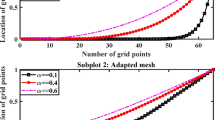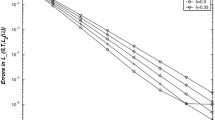Abstract
In a recent paper we showed numerically and theoretically that a straightforward generalisation of Alikhanov’s “L2-\(1_\sigma \)” scheme is \(O(M^{-2})\) accurate on suitably chosen graded meshes (with M time intervals) for initial-value problems (IVPs) and initial-boundary value problems (IBVPs) with a Caputo fractional time derivative of order \(\alpha \), whose solutions typically exhibit a weak singularity at the initial time \(t=0\). The present paper constructs a better generalisation of Alikhanov’s scheme that is demonstrated numerically to be \(O(M^{-(3-\alpha )})\) accurate for these classes of IVPs and IBVPs, but its rigorous analysis remains an open problem.
Access this chapter
Tax calculation will be finalised at checkout
Purchases are for personal use only
Similar content being viewed by others
References
Alikhanov, A.A.: A new difference scheme for the time fractional diffusion equation. J. Comput. Phys. 280, 424–438 (2015). https://doi.org/10.1016/j.jcp.2014.09.031
Atkinson, K., Han, W.: Theoretical Numerical Analysis. A Functional Analysis Framework. Texts in Applied Mathematics, 3rd edn. Springer, New York (2009). https://doi.org/10.1007/978-1-4419-0458-4
Chen, H., Stynes, M.: Error analysis of a second-order method on fitted meshes for a time-fractional diffusion problem. J. Sci. Comput. (2018). https://doi.org/10.1007/s10915-018-0863-y
Shen, J., Tang, T., Wang, L.L.: Spectral Methods, Algorithms, Analysis and Applications. Springer Series in Computational Mathematics. Springer, Heidelberg (2011). https://doi.org/10.1007/978-3-540-71041-7
Acknowledgements
The work of the first author was funded by the Chinese Postdoc Foundation Grant 2018M631316 and the National Natural Science Foundation of China young scientists fund Grant 11801026. The work of the second author was funded by the National Natural Science Foundation of China under grants 91430216 and NSAF-U1530401.
Author information
Authors and Affiliations
Corresponding author
Editor information
Editors and Affiliations
Rights and permissions
Copyright information
© 2019 Springer Nature Switzerland AG
About this paper
Cite this paper
Chen, H., Stynes, M. (2019). A High Order Method on Graded Meshes for a Time-Fractional Diffusion Problem. In: Dimov, I., Faragó, I., Vulkov, L. (eds) Finite Difference Methods. Theory and Applications. FDM 2018. Lecture Notes in Computer Science(), vol 11386. Springer, Cham. https://doi.org/10.1007/978-3-030-11539-5_2
Download citation
DOI: https://doi.org/10.1007/978-3-030-11539-5_2
Published:
Publisher Name: Springer, Cham
Print ISBN: 978-3-030-11538-8
Online ISBN: 978-3-030-11539-5
eBook Packages: Computer ScienceComputer Science (R0)




